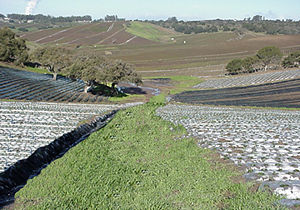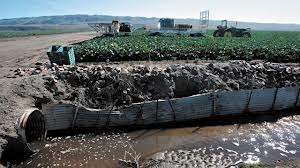Monterey County Farm Bureau
The Monterey County Farm Bureau (MCFB) is a membership-based non-profit organization. Their mission is to "promote the well being of agriculture through involvement in education, stewardship of natural resources, public policy development, and the resolution of community challenges" [1]. They are said to be the voice of agriculture in the Monterey Region.
History
In September 1919, 32 county farm bureau delegates, including representatives from Monterey County, met at U.C. Berkeley to prompt the creation of the California Farm Bureau Federation (CFBF). The university's Agricultural Extension was created in 1914, but the Extension's framework required that its education programs be brought only to farmers in counties in which a farm bureau representing at least 20 percent of the farmers had been established. The university and its Agricultural Extension Service effectively spurred the establishment of a state-wide farm bureau movement in California.[2]
Three weeks later, the American Farm Bureau Federation (AFBF) was founded at a meeting in Chicago, with California among the 31 states given voting privileges at the first meeting.
The AFBF formed to provide farmers a way to pursue a national-level, legislative agenda favorable to farmers. Early efforts focused successfully on allowing farmers longer term credit to carry crops through orderly marketing, tariffs to protect against competing imported farm crops and the general cooperative marketing plan outlined by Farm Bureau. While AFBF continues to lobby for primarily economic initiatives on farmers' behalf, and CFBF does much the same on a state level, the county farm bureau remains the nucleus of the organization and a forum where where agricultural interests, policies, and programs can address farmers' needs at the county level [3].
Regulatory Focus

Farming is a highly-regulated industry and the MFBF provides guidance to farmers on matters of air and water quality, immigration reform, food safety, land use, and labor safety, and other applicable laws. The regulatory environment can be onerous and contradictory. One example is the scrutiny brought to bear on food safety practices following the 2006 E. coli outbreak in bagged spinach traced to a farm in San Benito County, California, forced regional changes in the best management practices associated with food safety, that directly opposed the best management practices recommended to comply with the Clean Water Act's section 303d (see photo inset)[4].
In these instances the MFBF offers resources and training to help farmers prioritize when and how to implement regulatory requirements.

Training
The MFBF offers training and workshops about a variety of regulatory and technical issues. Additionally, the University of California's Agriculture Extension, now officially called the Natural Resources Coorperative Extension (UCANR) has maintained its historic alliance with the Farm Bureau network. The stated mission of the UCANR is to work hand in hand with industry to enhance agricultural markets, help the balance of trade, address environmental concerns, protect plant health, and provide farmers with scientifically tested production techniques and Californians with increased food safety. The UCANR maintains an office in Salinas and sponsors training and events aimed at supporting the needs of local farmers.
References
- ↑ MCFB. http://montereycfb.com/index.php?page=farm-bureau-mission
- ↑ CFBF http://www.cfbf.com/about/fbhistory.cfm
- ↑ AFBF http://www.fb.org/index.php?action=about.history
- ↑ CO-MANAGING FOR FOOD SAFETY AND ECOLOGICAL HEALTH IN CALIFORNIA’S CENTRAL COAST REGION http://www.pewhealth.org/uploadedFiles/PHG/Content_Level_Pages/Issue_Briefs/PSP_wildlife.pdf
Disclaimer
This page may contain student work completed as part of assigned coursework. It may not be accurate. It does not necessary reflect the opinion or policy of CSUMB, its staff, or students.